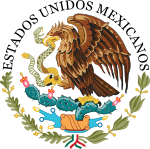Mexican government
| Gobierno Federal de México | |

Seal of the Government
|
|
| Formation | 1917 |
|---|---|
| Founding document | Constitution of Mexico |
| Jurisdiction | United Mexican States |
| Website | http://www.gob.mx/ |
| Legislative branch | |
| Legislature | Congress of the Union |
| Meeting place | Palacio del Senado (Senate) Palacio Legislativo de San Lázaro (Deputies) |
| Executive branch | |
| Leader | President of Mexico |
| Headquarters | Los Pinos |
| Main organ | Cabinet |
| Judicial branch | |
| Court | Supreme Court of Justice of the Nation |
| Seat | Mexico, D.F. |
The federal government of Mexico is the national government of the United Mexican States, the central government established by its constitution to share sovereignty over the republic with the governments of the 31 individual Mexican states, and to represent such governments before international bodies such as the United Nations. Similar to the federal government of the United States, the Mexican federal government has three branches: executive, legislative, and judicial. Through the system of separation of powers each of these branches has some authority to act on its own, some authority to regulate the other two branches, and has some of its own authority regulated by the other branches. The seat of the federal government functions per the Political Constitution of the United Mexican States, as enacted in 1917, and as amended.
The executive power is exercised by the executive branch, which is headed by the president and his Cabinet, which, together, are independent of the legislature. Legislative power is vested upon the Congress of the Union, a two-chamber legislature comprising the Senate and the Chamber of Deputies. Judicial power is exercised by the judiciary, consisting of the Supreme Court of Justice of the Nation, the Council of the Federal Judiciary, and the collegiate, unitary, and district tribunals.
The federal government, known as the Supreme Power of the Federation, is constituted by the Powers of the Union: the legislative, the executive, and the judicial. Mexico City, as the capital of the federation is the Federal District, the seat of the powers of the Union. All branches of government are independent; no two separate branches must be vested upon a single person or institution, and the legislative power must not be vested upon a single individual.
The legislative power is vested upon the Congress of the Union, a bicameral congress comprising the Senate (Spanish: Cámara de Senadores or Senado) and the Chamber of Deputies (Spanish: Cámara de Diputados). The powers of the Congress include the right to pass laws, impose taxes, declare war, approve the national budget, approve or reject treaties and conventions made with foreign countries, and ratify diplomatic appointments. The Senate addresses all matters concerning foreign policy, approves international agreements, and confirms presidential appointments.
...
Wikipedia
